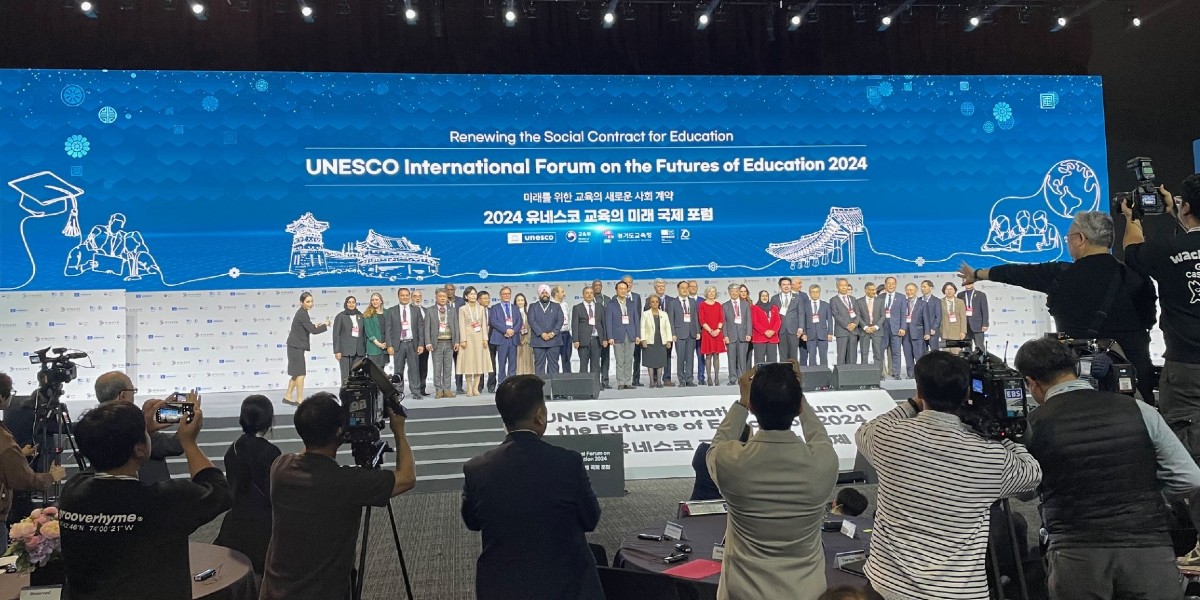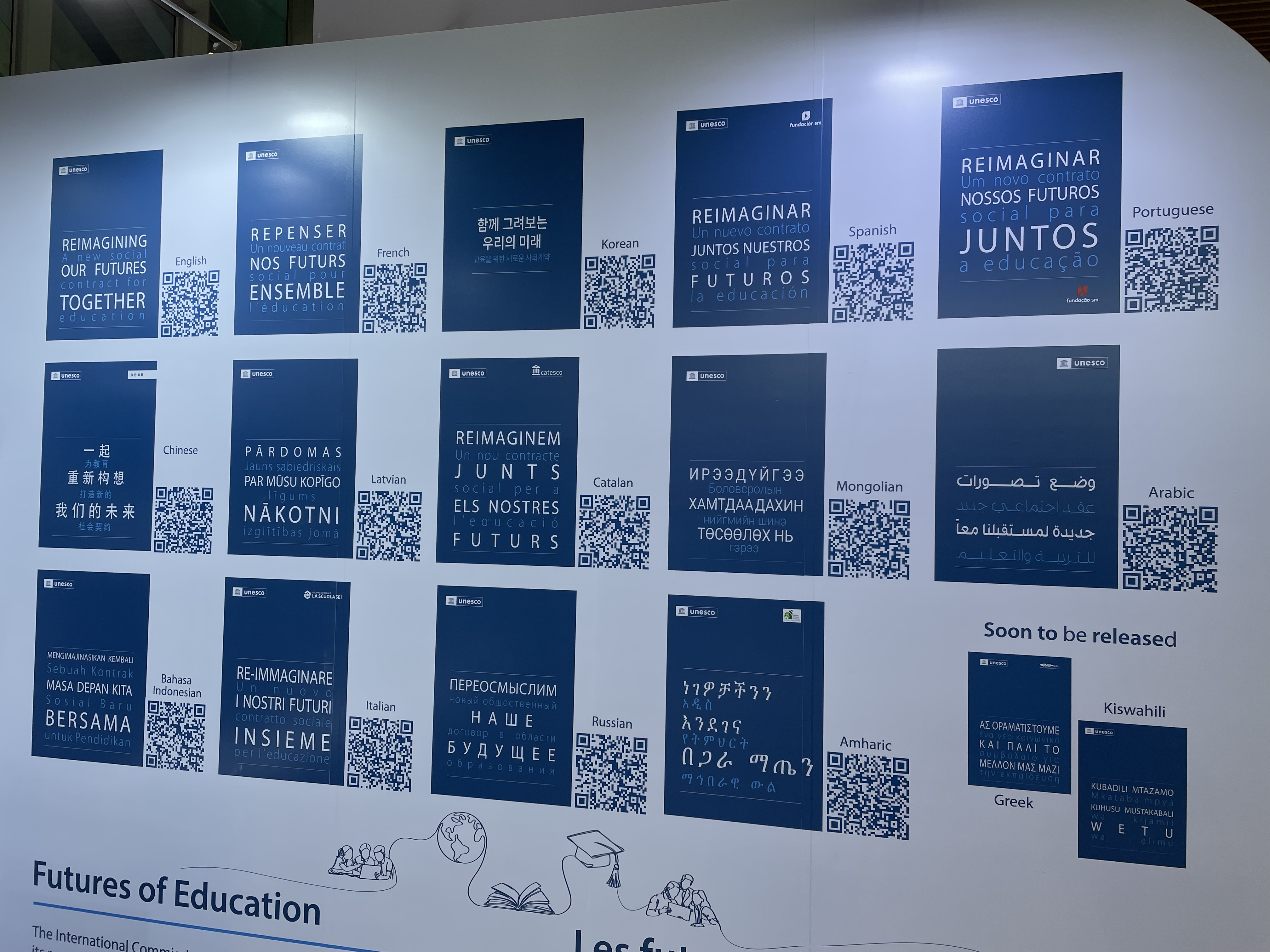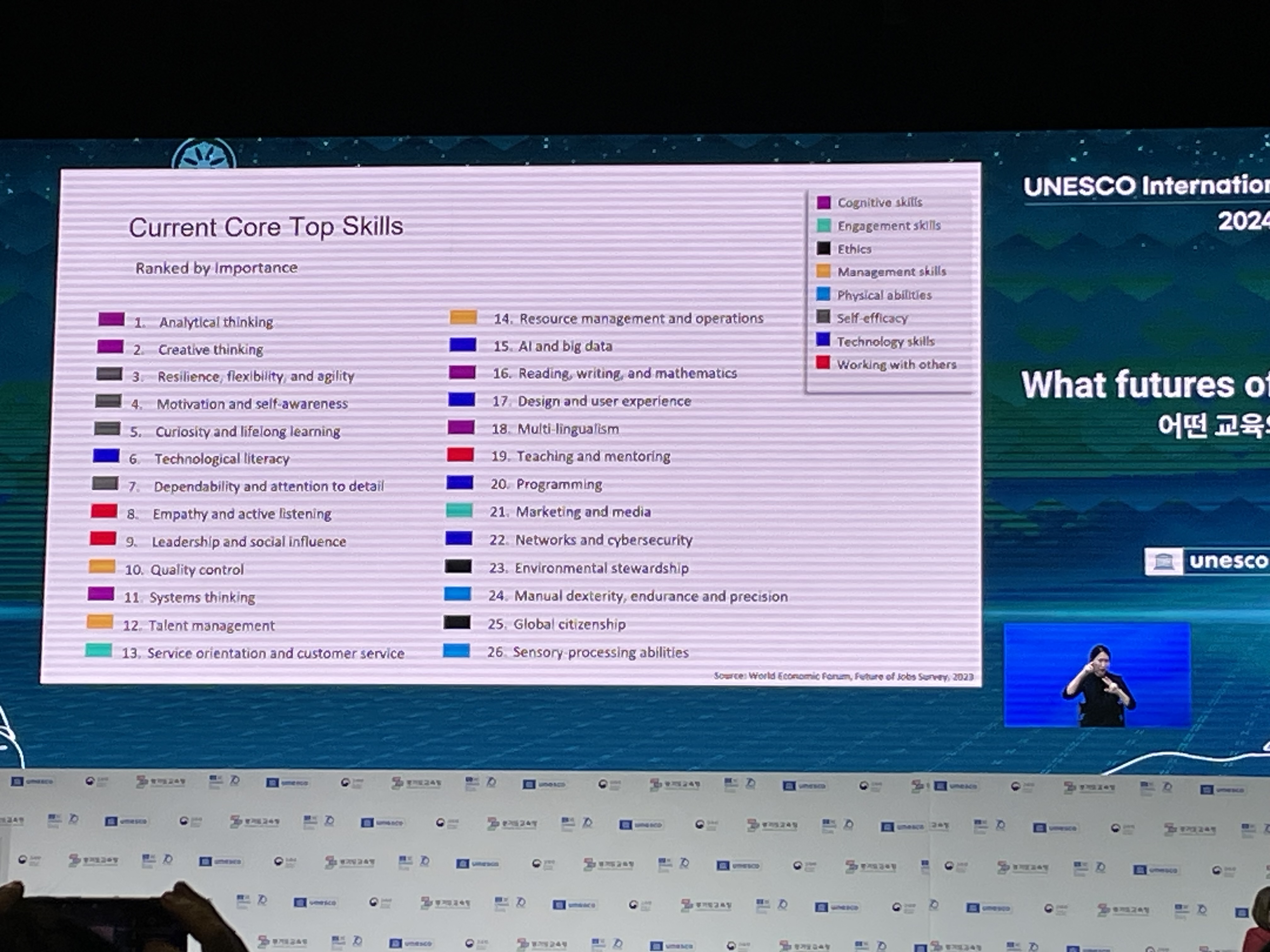What is the future of higher education? What are the futures of education? What can we learn from Korean reforms in education? We share insights from UNESCO international forum on the Futures of Education 2024.
There are even more complex questions in order to think about many futures of education as they were discussed during UNESCO International Forum on the Futures of Education in Suwon, Republic of Korea, December 2-4, 2024:
Can education cope with the fast changes in the technologies? What are human-centered approaches to technology in education? What made it possible for Korea to announce 9 major reforms in education with the main aim to provide personalized education for all? What is the story of European University alliances and E3UDRES2 from the global perspective? What can we offer as the unique added value to other global education champions?
UNESCO presents its long-term vision and a set of principles to realize the transformative potential of education in the 2021 report of the International Commission on the Futures of Education "Reimagining Our Futures Together: A new social contract for education".
This report is broadening the conversations on philosophies and principles needed to guide education. The report is translated already in 16 Languages, among these also in Portugese and Latvian.
The discussions in this forum built upon the concepts which were already proposed in the 2021 report and were exploring more HOW the proposed visions and principles might be applied: how to rebuild our relationships with each other, with the planet, and with technology. The participants of the Forum reflected on the three key questions which should be relevant also to every E³UDRES² meeting:
1) What should we continue doing?
2) What should we abandon?
3) What needs to be creatively reimagined?
Trends on Current Core Top Skills
According to Future of Jobs Report 2023 (World Economic Forum) the top 10 skills are following:
When we look at the current core top 10 skills, you can see that the majority of them are linked to cognitive and self-efficacy skills, as well working with others. We can also describe them as skills which AI is missing. Therefore the guiding question for next period would be how to develop skill which AI is missing and how the assessment models in education should be changed in order to assess the future skills.
During autumn 2024 E³UDRES² team working on Future University topics also discussed trends on future jobs. These are the first trends reviews from E³UDRES² Future University Think Tank which provide short summary in two pages what is this report about, what are the key take aways and what opportunities do we see there for E³UDRES²:
- The Trend Review on The Rise of Global Digital Jobs. White paper, January 2024;
- The Trend Review on Future of Jobs Report 2023. Insight report. World Economic Forum. 2023.
These are examples of E³UDRES² Future University team work and how E³UDRES² Future University Think Tank will develop and not only gather the insights, but also provide the platform for E³UDRES² leaders to discuss the trends and think about different scenarios.
Exploring Alternative Futures of Education
Discussing different future scenarios can help us anticipate, be more resilient and future-proof and innovate in our actions today. UNESCO approach to building future scenarios is following:
1) purposing - establishing why scenarios are useful;
2) exploring - understanding the characteristics and logic of the scenario;
3) identifying implications - considering how the user would fare in the scenarios;
4) taking strategic action - returning to the present-day actions of the user organisation.
The climate crisis, the rapid development of artificial intelligence, increasing inequality and the polarization of society are cited as major challenges. These issues underpin the uncertain futures and, at the same time, offer opportunities for education to find appropriate solutions and to identify the future it wants.
There are reports available on the global mega trends, which will influence education. OECD provides its scenarios for future schools. There are countries where future strategic foresight is the PhD program. And many sessions at this forum offered different approaches how to think about WHY? WHAT? And HOW?
What gaps do we want to fill using E3UDRES2 network? Current challenges and gaps are the key drivers for our joint strategy as it provides many opportunities and innovative ways for doing things jointly.
There is a clear dominance of technologies in discussions about education. Earlier the technologies were the branch of the education. Now they have become the core of education. And there is a claim that education should invest as much R&D in AI & pedagogy as companies are investing already in their priority areas.
One of the initial goals for participating in this forum was to understand whether the main goals of E3UDRES2's Future University team are in line with global trends and whether we haven’t missed something crucial. Examples provided at the UNESCO Forum demonstrated that E3UDRES2 Future University Think Tank has the place for both its main directions: 1) it is a place for policy and research analysis, internal discussions in various smaller groups or task forces and finding answers in the context of E3UDRES2, and 2) for testing future methods, building E3UDRES2 future scenarios, and raising the capacity of E3UDRES2 team to be able to transfer and interpret visions of global education in aspects important to our regions.
Major Education Reforms in the Korean education system
During the forum Ministry of Education of the Republic Korea and Gyeonggido Office of Education (the largest region of Korea) presented nine major education reforms. The aim of the reforms is to provide personalised education for all and these reforms cover all the levels of education starting from the kindergarten up to the higher education, and includes also the transformation of the ministry of education itself. This is how Korea envisions that it can solve societal challenges with the power of education. The main key words for Gyeonggifo Office of Education are “autonomy”, “balance”, and “future”. You can find these guiding messages on all the materials provided by this office and they are present in all the visual communication.
The republic of Korea has started its reforms already in 2022, this year they have intensive training for teachers in order to equip with the necessary skills and competence to be a driver and co-assistant of knowledge in the new type of classroom. These reforms will conclude in 2028 when universities will have to adopt new admission which will be based on the outcomes of reforms in the previous education levels. What you can hear when you watch the recordings the 1st day, December 2, 2024 of UNESCO forum, starting from 3h:50min (https://www.unesco.org/en/renewing-education-transform-future), that Korea is ready to accept the AI text books, AI driven classroom, AI assisted teaching and AI guided learning analytics.
These examples show that there is no one simple and fast method how to implement the transformation of the education system. It is a very complex system and you need a holistic view at all the levels of education. Nothing substantial will change if you tackle only one small area of this system. You have to start from the first education program in kindergarten and see how the proposed changes transform the life-long and life-wide education.
In general, the majority of Korean reforms in relation to higher education are in line with E3UDRES2 mission and long-term vision: universities as the drivers of innovation ecosystems in the regions, global universities which are using global knowledge to solve local challenges, co-creation and co-ownership at the regional level. What is different it is the concrete plans with the deadlines and activities, brave use of new technologies where ever they fit, and alignment with reforms at other levels of education.
Future Wish for E³UDRES²
"We will need the entire worlds' creativity and intelligence to ensure that inclusion, equity, human rights, and peace define our future." (Audrey Azoulay, Director-General of UNESCO)
No matter how complex and difficult it is sometimes to reconcile the different viewpoint of E3UDRES2 9 universities and agree on one joint solution, from the global perspective, it is not longer a question if we should continue this. This UNESCO forum has highlighted well that it is better sooner than later that E3UDRES2 has its own joint solutions if we want European higher education to be able to compete with other regions of the world.
My wish for E3UDRES2 would be to become an inspiring story to be shared at UNESCO Global Observatory, which was announced as the key forum outcome and will be active for next two years. Global Observatory will gather the insights on how to translate the vision of the future of education into practice. It will also provide the global network for those who are working with the foresight, anticipation and futures thinking. E3UDRES2 and its achievements should be presented also at next UNESCO forum on the Futures of Education in 2026. E3UDRES2 has everything what is needed to be the example on how locally and democratically envision the future of our regions and translate and contextualize the future relationships with each other, with the planet, and with technology. Please find below a list of inspiring sources from this forum and E3UDRES2 Future University Think Tank.
Thanks to:
E3UDRES2: for the opportunity to find out about this UNESCO initiative and visit Suwon, Republic of Korea and UNESCO forum on Futures of Education
Ministry of Education of the Republic of Korea and Gyeonggido Office of Education: for the hospitality, well prepared and well organised forum and excellent site visits to Gyeonggido schools
UNESCO: for many insights into global trends and future opportunities of education
Latvian National Commission for UNESCO: for support in the preparation of this forum
ViA and ViA UNESCO Chair “Biosfere and man”: for encouragement to participate in UNESCO events
Author of article:
Iveta Putniņa
Development vice-rector
E³UDRES² Site Coordinator at Vidzeme University of Applied Sciences




